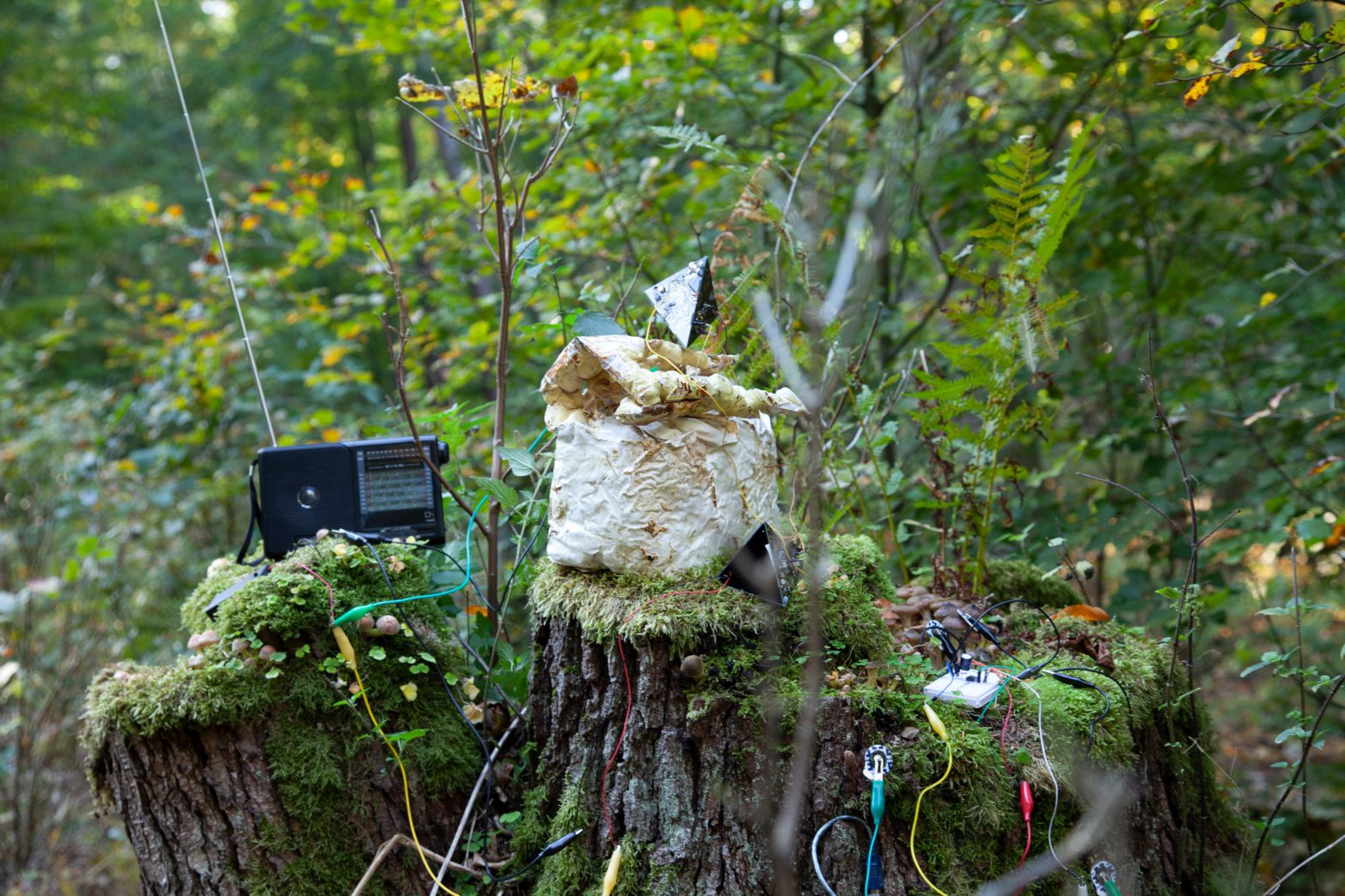Ferment Radio features a conversation with Mindaugas Gapševičius on collaborations between people, microorganisms, and tools.
Continue reading “Interspecies collaborations (with Mindaugas Gapševičius)”Ultra-Low-Voltage Survival Kit #2
The reduced version of the Ultra-Low-Voltage Survival Kit is on view at the Eigenheim Gallery in Berlin from 22.05.2020 to 11.07.2020. It refers to the nature of the electrical signal as the base for digital computation and invites the user to experience electricity with their bodies. The toolkit includes tools for building up an interface to light up an LED by energy generated by the human body.
Continue reading “Ultra-Low-Voltage Survival Kit #2”Biochemistry of Emotions
In collaboration with Hege Tapio and Auksė Gaižauskaitė
A three days long workshop will be led by artists Hege Tapio and Mindaugas Gapševičius, and scientist Auksė Gaižauskaitė. Besides trying to understand empathy we will take a look into biochemical and physiological processes in the human body. We will also work on our ideas, to be presented by the end of the workshop.
Organized in a non-disciplinary laboratory Alt lab on the 15–18 of February 2020, located in a new cultural center “Sodas 2123” (Vitebsko 21 & 23, Vilnius). The workshop invites everyone interested in the biological basis of empathy, art, and interdisciplinary projects.
Continue reading “Biochemistry of Emotions”Preview of Proposal for Microbial Therapy
My latest work Proposal for Microbial Therapy (work in progress) is on display during the launch of the alt lab, an alternative non-disciplinary research laboratory in Vilnius.
Event date & time: 28 December 2019, 6 PM
Location: alt lab, SODAS2123 cultural centre “Sodas 2123” (Vitebsko 23, Vilnius, room 304)
Lactose intolerant? Let’s employ bacteria!
In collaboration with Auksė Gaižauskaitė
Location: alt lab (Vitebsko Str. 23, room 304, Vilnius, cultural centre “Sodas 2123”)
Time: 7–8 December 2019, 12 noon to 4 pm.
A creative workshop titled “Lactose intolerant? Let’s employ bacteria!” will be organised in an alternative non-disciplinary research laboratory Alt lab on the 7–8 December 2019, located in a new cultural centre “Sodas 2123” (Vitebsko 21 & 23, Vilnius). The workshop will invite everyone interested in art and science projects, the influence of microorganisms to our bodies and our ability to control them, to join for a session of experimentation.
Continue reading “Lactose intolerant? Let’s employ bacteria!”Introduction to Posthuman Aesthetics @ Campus Ars Electronica
Installation with toolkits, manuals, and video tutorials
September 5-9, 2019
Opening reception September 4, 18:30 @ Kunstuniversität Linz
The Introduction to Posthuman Aesthetics with its four toolkits, manuals, and video tutorials is featured this year at the Ars Electronica within the “Shared Habitats” exhibition of the Bauhaus University Weimar.
Continue reading “Introduction to Posthuman Aesthetics @ Campus Ars Electronica”Radio Mycelium & How I Hack Plant Conversations
Workshop with Mindaugas Gapševičius, Jan Georg Glöckner, and participants. In collaboration with Martin Howse
2019 07 20-22
To register please send short motivation letters to mo[@]mo.lt till June 10.
The experiment invites participants to experience interspecies communication and feedback loops between mycelium networks and their habitats, including other organisms and beings. It also proposes the examination of a new networked imaginary between electrochemical signals, digital data, and electromagnetic waves.
Continue reading “Radio Mycelium & How I Hack Plant Conversations”Lactose-Intolerance DNA Portraits @ MO
Workshop with Mindaugas Gapševičius, Auksė Gaižauskaitė, Miglė Kalvaitytė, and participants
2019 06 15-17 @ MO, Pylimo g. 17, Vilnius 01141, Lithuania
To register please send short motivation letters to mo[@]mo.lt till June 9.
Have you ever thought about a genome encoded in DNA? What invisible features are hidden in your body? What diseases might you potentially have? The theme introduced during the experiments is conceptually wrapped and speculated about in the toolkit “How I prepare myself to be cloned.”
I, Machine, and Energy Harvesting @ MO
Workshop with Mindaugas Gapševičius, Wolfgang Spahn, and participants
2019 05 25-27, Pylimo g. 17, Vilnius 01141, Lithuania
To register please send short motivation letters to mo[@]mo.lt till May 19.
Microprocessors implanted in a human, or prostheses mounted on a human might be driven by ultra low voltages gained from the human body. Ultra low voltages could also be used for charging devices like watches or phones. But how about using the gained voltages for leisure? Or creative processes? Continue reading “I, Machine, and Energy Harvesting @ MO”
SCOBY, Shit and Humus @ MO
Workshop with Mindaugas Gapševičius, Juan Pablo Diaz, Julian Chollet, and participants
2019 05 04-06 @ MO museum, Pylimo g. 17, Vilnius 01141
Experimentation unfolds through the investigation of SCOBY, shit and humus, which raises questions: What does symbiosis really mean? How can we understand the complex interaction between microorganisms, plants and animals? How is self-organization related to being alive? Continue reading “SCOBY, Shit and Humus @ MO”









